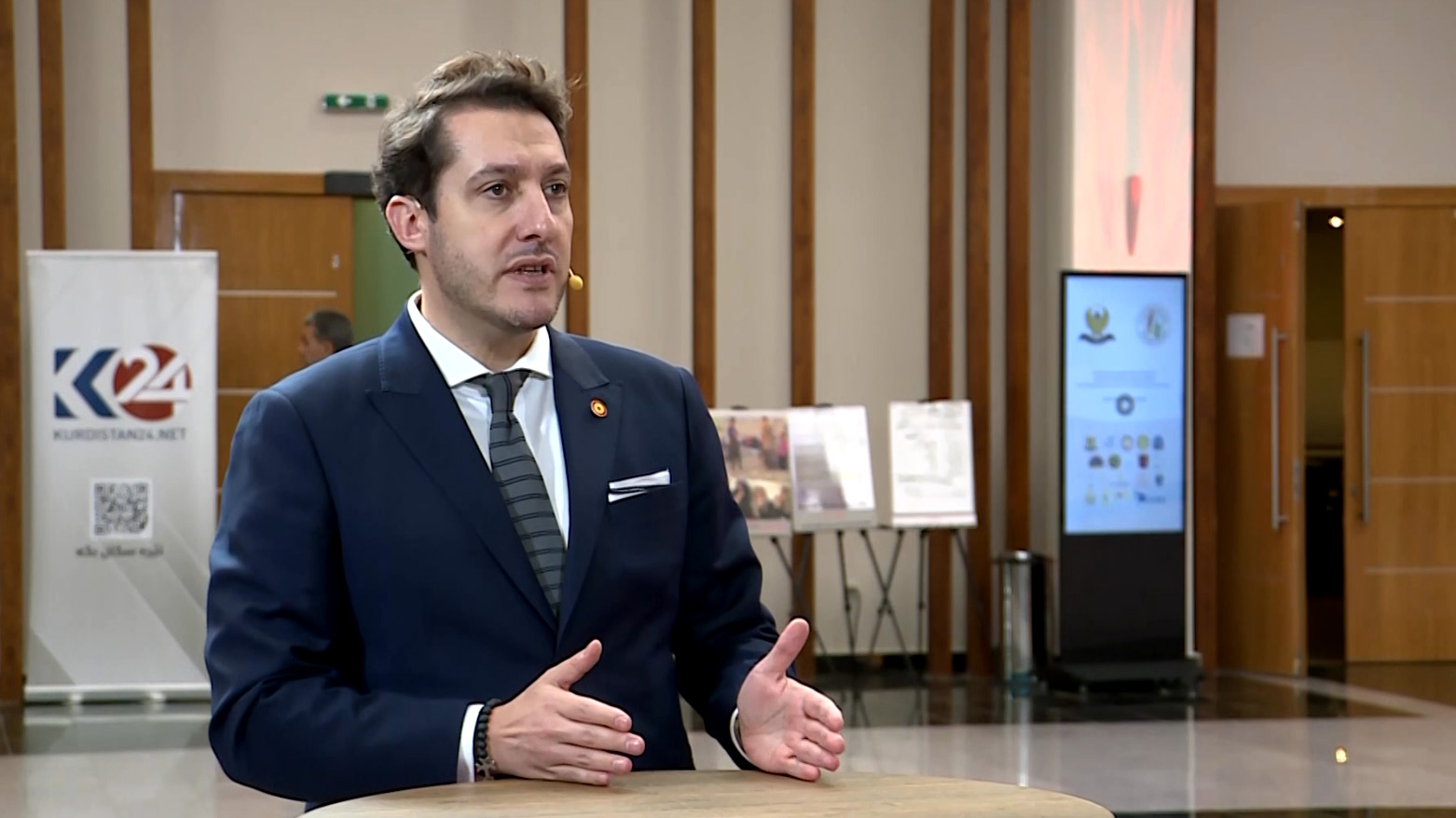European Youth Leader Calls for Global Recognition of Kurdish Genocide
European youth leader Javier Hurtado Mira called for international recognition of the Kurdish genocide at Duhok University's Fifth International Scientific Conference. He emphasized education and cooperation to prevent future atrocities and condemned Baghdad's salary cuts as "economic genocide."

ERBIL (Kurdistan24) – Speaking to Kurdistan24 on the sidelines of the Fifth International Scientific Conference on the Kurdish Genocide at the University of Duhok, Javier Hurtado Mira, Chairman of the Democrat Youth Community of Europe (DEMYC), called for international recognition, academic cooperation, and education as the only lasting ways to prevent any future genocides against the Kurdish people.
Mira, who has visited the Kurdistan Region five times and previously served as an observer during the 2017 independence referendum, emphasized that the annual conference represents not only remembrance but also a collective responsibility to ensure justice and awareness across generations.
“I think it is very important to organize such gatherings annually to remember all the victims of the Kurdish genocide,” Mira said. “These events allow academics and politicians from different backgrounds to come together in search of truth and justice. For Europeans like me, it is crucial to commemorate the victims and to ensure such tragedies never happen again — especially in a world that once looked away.”
He noted that the participation of international figures in Duhok underscores the growing recognition of the Kurdish experience and the importance of documenting the crimes committed during the Anfal Campaign and other genocidal operations.
Mira stressed that the most powerful response to genocide is education and cooperation, not revenge or silence.
“Only through education, shared experience, and collaboration can we prevent new genocides,” he said. “It happened with the Armenians, it happened in Africa, and it happened to the Kurdish people in the 1980s and 1990s. The only way forward is by sharing knowledge, promoting peace studies, and working together with the United Nations and academic institutions.”
He praised the Duhok conference as a key platform for international partnership, adding that “building departments on peace and violence prevention, and encouraging youth dialogue, are vital steps to ensure that such crimes never repeat.”
In response to a question from Kurdistan24 regarding the salary cuts imposed by Baghdad on public sector workers in the Kurdistan Region, Mira described the policy as a form of “economic genocide.”
“It is very unacceptable that Baghdad uses these boycott powers against Kurdish civil servants,” he said. “If Kurdistan is still considered part of Iraq, the government cannot stop paying its own workers. Boycotting the Kurdish people at an institutional level is unfair and possibly unconstitutional. The dignity of every citizen must be respected, and that includes the right to receive their salaries.”
Mira urged the Iraqi government to “respect the Kurdish people’s rights and dignity,” saying that economic discrimination damages trust and undermines peace.
Mira highlighted the critical role of Kurdish youth in carrying the legacy of remembrance forward. As chairman of DEMYC, he said his organization has cooperated with Kurdish youth for over a decade through academic exchanges and political training programs.
“Today’s generation has no excuse not to know what happened,” he stated. “They must engage with the Kurdish people, understand their history, and work together for a peaceful future. Kurdish youth are ready to lead without violence, to negotiate with the West, and to build a strong society through education and entrepreneurship.”
He emphasized that encouraging Kurdish youth participation in civil society, academia, and politics would benefit not only Kurdistan but also the entire Middle East.
In conclusion, Mira expressed cautious optimism about the future of Kurdistan, stressing that international awareness and cooperation are vital to preventing future atrocities.
“History shows that genocides could have been prevented if the world acted earlier,” he said. “The more international attention the Kurdish case receives, the easier it will be to stop such crimes from happening again. I believe the Kurdish people deserve a peaceful future, and the sooner they can govern their own institutions and shape their destiny, the better for everyone.”
The Fifth International Scientific Conference on the Kurdish Genocide, attended by President Masoud Barzani and Prime Minister Masrour Barzani, brings together scholars, survivors, and policymakers to document and preserve the history of the Kurdish genocide — including the Anfal Campaign, which claimed over 182,000 Kurdish lives between 1987 and 1988.
The conference, organized by the KRG’s Ministry of Higher Education and Ministry of Health, aims to strengthen research, identify mass graves, and establish an irrefutable scientific record for global recognition and justice.